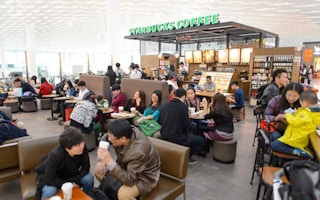Sipping Starbucks coffee sourced from responsible farming communities may send a warm feeling down consumers who are concerned about sustainability. But that bagel? It’s not doing so well.
Anti-deforestation campaigns group Forest Heroes said in a statement on Wednesday the world’s largest coffeehouse chain may have scored high on selling beverages such as coffee, tea and cocoa produced at ethically-run farms, but it has yet to implement a sourcing policy that ensures the ingredients of its baked products are from responsible palm oil plantations.
To mark Global Tiger Day on July 29, Forest Heroes and consumer movement SumOfUs, urged Starbucks to put in place a clear palm oil sustainability policy and ensure none of its products contains palm oil that was grown from destroyed forests and wildlife habitats in tropical countries.
The coffee giant said in April this year that it has achieved 99 per cent of its goal to source coffee from farming communities that are managed ethically. However, the food it offers such as pastries, breads and cookies has yet to meet the same sustainability standards, the environmental group said.
The rampant destruction of forests to pave way for palm oil plantations in Southeast Asia and Africa has led to the loss of habitats for animals such as tigers and orangutans. Conservation groups say tigers are a highly endangered species with only about 3,000 left in the wild in 2014.
“Starbucks has become a sustainability champion for its coffee. Now its customers and the world’s last 400 Sumatran tigers are counting on them to take deforestation off the menu entirely,” Ben Cushing, spokesperson for the Forest Heroes campaign, noted in the statement.
Starbucks in 2013 committed to a policy to source from suppliers that buy palm oil from sustainable plantations, which it will apply to all its products by 2015.
The firm said it has a “zero tolerance” approach to deforestation and cited in its sustainability statement that all its products that contain palm oil will be 100 per cent certified by the industry group Roundtable for Sustainable Palm Oil (RSPO).
Despite this pledge, the firm is one of the US multinational companies which scored low - only 10 out of 100 points - in a Palm Oil Scorecard released in April this year by the Union of Concerned Scientists (UCS), a non-profit organisation of US-based scientists who use their expertise to address environmental and social problems.
Miriam Swaffer, corporate policy advocate with UCS’s Tropical Forest and Climate Initiative, also pointed out that Starbucks should have a clear timeline of its palm oil policy.
“If Starbucks wants to be a true sustainability leader, then it must adopt sourcing policies for all of its products that ensure the protection of forests and peatlands, which includes a specific timetable for implementation,” stated Swaffer.
Meanwhile, SumOfUs, which creates campaigns to hold big corporations accountable for their actions, urged the coffee giant to go beyond its RSPO membership, adding that RSPO cannot guarantee that the palm oil it certifies is not tainted with deforestation.
“If it truly wants to make a difference in the palm oil sector, Starbucks needs to go beyond RSPO — something that dozens of companies have already done,” SumOfUs stressed in a separate statement.
About 170,000 consumers globally have already signed petitions at the SumOfUs website, calling on Starbucks to follow other US food chain giants which have committed to a zero-deforestation policy.
Forest Heroes also emphasised that Starbucks’s sustainability statement is limited because it does not cover the firm’s global operations, but only in its company-owned stores, mainly in the US. Starbucks has nearly 22,000 stores worldwide.
Cushing commented: “If companies like Dunkin’ Donuts, Krispy Kreme and McDonald’s can use responsible palm oil that doesn’t come at the expense of forests, endangered species or local communities, then why can’t Starbucks do the same?”

















